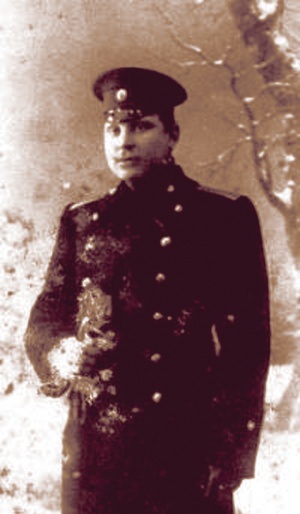Difference between revisions of "Thatig Homdjir"
Pittman789 (talk | contribs) |
Pittman789 (talk | contribs) |
||
| Line 3: | Line 3: | ||
| image = Bann_Schemer.jpg | | image = Bann_Schemer.jpg | ||
| alt = | | alt = | ||
| caption = | | caption = President Homdjir's Official Photograph Portrait c. 1855 | ||
| birth_name = | | birth_name = | ||
| birth_date = {{Birth date|1804|09|13}} | | birth_date = {{Birth date|1804|09|13}} | ||
Revision as of 05:31, 3 January 2019
| Thatig Homdjir | |
|---|---|
 President Homdjir's Official Photograph Portrait c. 1855 | |
| Born | September 13, 1804 |
| Died | April 18, 1888 (aged 83) Weachen, Shohuan |
| Nationality | Shohuanese |
| Other names | Bannen the Great |
| Alma mater | National University of Weachen |
| Occupation | Republican National Guard |
| Years active | 1828 - 1842 |
| Known for | Longest Serving President of Shohuan Military and Political Theorist |
| Notable work | Treatise on the Ailments of Men and Sentients Alike |
| Title | 12th President of Shohuan Emperor of Algador |
| Term | 1854 - 1872 |
| Predecessor | Annu Weaeche |
| Successor | Natter Inaouer |
| Spouse(s) | Empress Diaena Gyo 1837 - 1871 |
| Partner(s) | Susceib Coke Nurséétú Éénú |
Thatig Homdjir was Shohuan's most notable president, beginning numerous reforms, aiding in the industrialization of the nation, creating the Republican Navy along with the colonial expansions of the nation, and established Shohuan as the modern, cultural capital of Vaniu. His reforms and actions led to the rise of the Shohuanese state in international politics in a format he called "Vdeþþaiêwitsez Hollhuq" (Threaded Politics) while also playing a major role in the downfall of the Terminian Three Kingdoms which had always been a strong competitor against Shohuan's expansion and trade.
Early Life
Military Career
Major General
Political Career
Diplomat
The Algeluer Expedition
As Bann Schemer had arrived in Algador, he was under orders to better relations with the Algadorian Emperor. He had tried time and time again to receive audience with the Emperor but to no luck. He was, however, invited to the annual charity ball that the Gyo dynasty had held, and there he had met the Emperor's heir apparent and daughter; Diaena Mal'la Gyo. The two had met and soon hit it off with one another and with his newly established connection he could gain audience with the Emperor. However, Bann had stepped out of line when an affair with the princess began. The Emperor of Algador was unwilling to allow a marriage with a non-noble but as the man had persuaded the Algadorian Emperor of Shohuan's growing potential as an ally, the emperor allowed it on the condition that Algador and Shohuan become official allies with the allowance of the marriage. He willfully agreed to the proposal and soon married the princess of Algador cementing the alliance. The senate of Algador and the President was not pleased, however, as the marriage was seen as "problematic" and "guaranteeing a conflict with Algador's neighbours" and so he was ordered to divorce the princess which he had fervently refused resulting in his recall from the nation in 1838.
Return to Shohuan
Presidential Election of 1854
Election of 1849
Early Presidency
Role in the Mezkan Crisis
Inheritance of the Algadori State
Conflict with Terminia
Late Presidency
Political Downfall
Retirement
After Bann's loss in the 1872 election due to the events that conspired around him, he left into retirement. His time in retirement gave him opportunities to spend time with his now grown children, as well as time to write works. Bann's most notable work was the Treatise on the Ailments of Men and Sentients Alike which was his memoirs of life and his struggle to balance the consequences of the decisions he had made. It includes information such as what he had experienced while in the military and his enterprises as President of Shohuan. It has been translated into 57 different languages and at one point was a best seller in Shohuan and Sotanxina. In his retirement, with the funds he saved he invested in the newly established stock market and soon became one of Sahar's first millionaires, becoming one of the richest men in the world. He turned to religion and even denounced the growing welfare movements in the Shohuanese state, calling them "The death of the national treasury". He was interviewed numerous times by the local newspaper in the capital, but after an interview gone sour in 1882, he stopped accepting them and turned to writing his own works.
Death & Legacy
On 18 April, 1888, Bann was found dead in his sleep at the age of 83. In his life, he had annexed numerous lands, had a possible record number of children, and became one of the wealthiest people on Sahar. His family still enjoys the fruits of his success as the Schemer International Banking Corporation, later renamed to "Schemer Enterprises". His actions led to the globalization of numerous regions of Sahar and was responsible for many public works and trade connections that were previously non-existent, leading to a regional boom in the economy that proved enough to topple the Terminian Empire. His reign led to a dramatic change in the international politics of Sahar. He had attributed to his success in that "Pure luck alone cannot build empires, but it can surely make them bend." He theories on warfare, politics, and economics left him with limited fame and his exploits with numerous mistresses left many as naming him "A debauchee of the highest order, but nonetheless a sharp witted man with a keen eye on what can and hasn't be grasped." His death was met with mourning in the Shohuanese state as his actions were felt positively by most in the nation, despite the blunders in the later years of his reign.